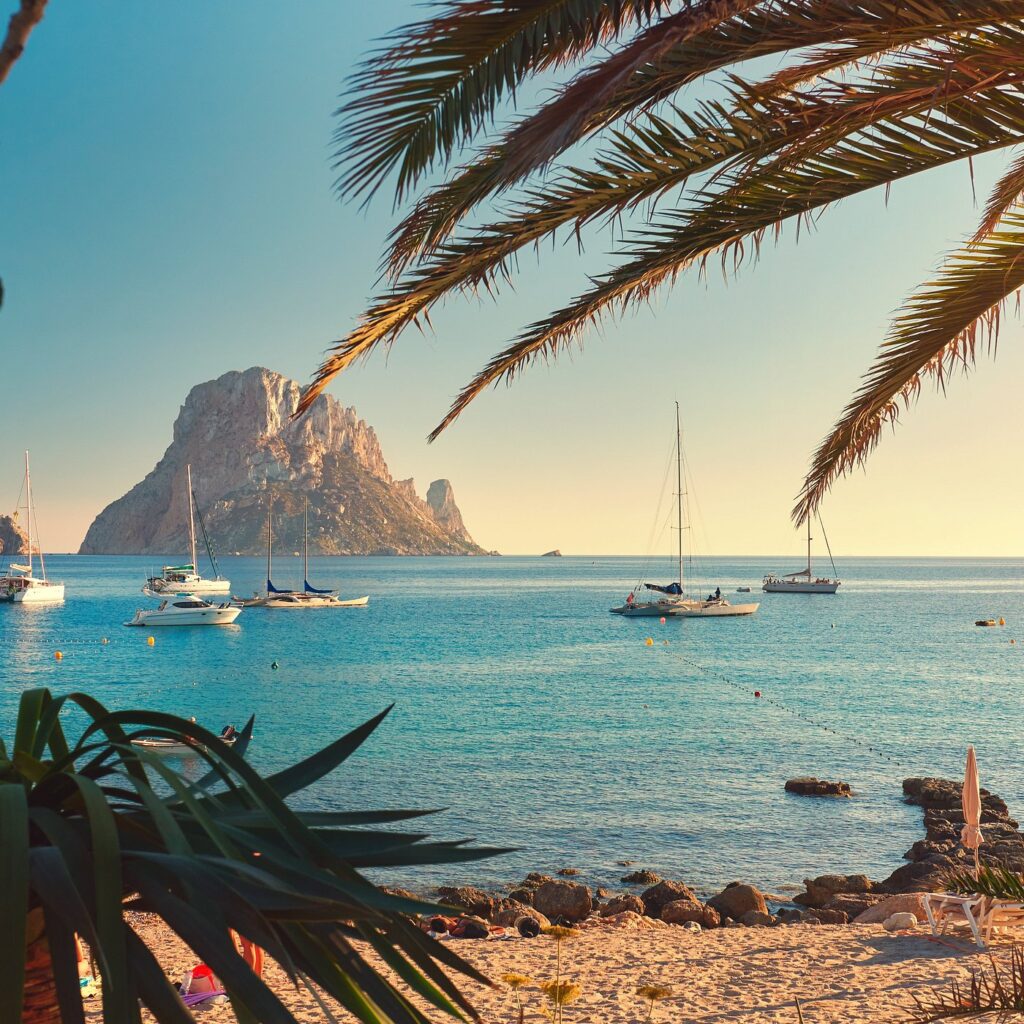Once a cornerstone of Spain’s summer tourism economy, Ibiza is now grappling with a dramatic 56% drop in travel interest for the 2025 season. The decline is fueled by a growing backlash against overtourism, escalating local protests, and increasingly strict regulations aimed at reining in the island’s infamous party culture. From alcohol bans and restrictions on party boats to public demonstrations and strained infrastructure, the island’s carefree image is giving way to a more complex reality, prompting many travelers to look elsewhere and raising broader concerns for Spain’s tourism sector at large.
From Quiet Island to Global Party Epicenter
Before Ibiza became synonymous with nightlife and electronic music, it was a tranquil Mediterranean island sustained by farming, fishing, and artisan crafts. That changed in the 1960s, when an influx of sun-seeking travelers marked the beginning of its transformation into a tourism hub.
The 1970s saw the rise of now-iconic clubs like Pacha, solidifying Ibiza’s status as a global party destination. For decades, its beaches, festivals, and open-air dance floors drew millions from around the world. Hï Ibiza and Ushuaïa and have established themselves as some of the best clubs in the world.
2025: A Marked Shift in Travel Behavior
According to data from a luxury yacht charter firm, online searches for Ibiza holidays—including hotels and private rentals—have plummeted more than 50% compared to the previous year. This drop goes beyond fleeting curiosity; it signals a real contraction in demand just ahead of the high season.
Multiple factors are converging to alter the island’s appeal and drive travelers toward alternative Mediterranean destinations.
Local Pushback and the Rise of Anti-Tourism Sentiment
At the heart of Ibiza’s tourism slump is growing unrest among residents. Years of unchecked visitor growth have strained public services, inflated housing costs, and eroded the island’s cultural identity.
In protest, locals have staged demonstrations, spray-painted anti-tourism slogans, and blocked access to popular attractions. These acts, while aimed at preserving community integrity, have begun to influence how outsiders perceive the island—no longer as a haven of freedom, but as a destination fraught with tension.
Infrastructure Under Pressure
The summer surge in tourist numbers has overwhelmed Ibiza’s infrastructure. Congested roads, overcrowded beaches, and pressure on water and waste systems have become routine. Locals struggle to find affordable housing as short-term holiday rentals dominate the market.
Environmental concerns are also rising, with illegal beach parties, habitat damage, and increased pollution feeding public discontent and further discouraging mindful travelers seeking more authentic and sustainable getaways.
A Crackdown on Excess: New Laws Reshape the Experience
To restore order and protect quality of life, authorities have rolled out tough new regulations. A strict alcohol sales ban between 9:30 p.m. and 8:00 a.m.—first introduced in 2020—was tightened in 2024, with steeper fines for violations. Public drinking is now punishable by penalties ranging from €500 to €1,500.
Party boats, once central to Ibiza’s appeal, are now banned within one nautical mile of key towns. Operators can no longer pick up or drop off guests in restricted zones, and advertising such services is illegal. These measures, though welcomed by many locals, are diminishing Ibiza’s allure for its traditional party-going demographic.
Impact on Group Travel and Event-Based Tourism
Ibiza has long been a hotspot for group celebrations— bachelor’s and bachelorette parties, birthdays, and graduation trips. But as restrictions mount, many of these groups are pivoting to more permissive destinations. The island’s party economy, heavily reliant on such seasonal spikes, is already feeling the strain.
Clubs, bars, and event planners face significant revenue risks as group bookings drop and party tourism loses momentum.
A Regional Shift: Travelers Seek New Horizons
Ibiza’s challenges are part of a broader Mediterranean trend. Venice, for example, has seen a 46% decline in search interest after enacting new taxes and visitor caps. Travelers are becoming more discerning, weighing destinations based on sustainability, crowd levels, local sentiment, and regulatory ease.
This shift is benefiting emerging alternatives in Croatia, Portugal, and lesser-known parts of mainland Spain—destinations offering natural beauty without the crowds, tension, or restrictions.
Economic Fallout for Spain’s Tourism Industry
Tourism is a major pillar of the Spanish economy, and the Balearic Islands play an outsized role in that success. A sustained drop in Ibiza’s visitor numbers could have cascading effects, impacting jobs, hospitality revenue, and local businesses reliant on seasonal demand.
Yacht rentals, nightlife venues, and excursions are already seeing booking slowdowns. Without a strategic pivot, Ibiza’s tourism-dependent economy could face a deeper contraction.
Opportunity or Omen?
The sharp downturn may represent more than a temporary setback. Ibiza is at a crossroads: it can either reposition itself toward sustainable, culture-focused tourism or risk long-term decline.
With its rich history, natural beauty, and artistic heritage, the island has potential beyond nightlife. Wellness retreats, cultural tourism, eco-experiences, and digital nomad infrastructure could pave the way for a new kind of traveler—one aligned with the island’s evolving identity.
But realizing this vision will require strategic investment, improved infrastructure, and innovative destination marketing.
Ibiza as a Cautionary Tale and a Case Study
Ibiza’s trajectory is a warning—and a lesson—for global tourism hubs facing similar pressures. Balancing economic gain with community well-being and environmental protection is a delicate challenge.
If Ibiza succeeds in recalibrating its approach, it could emerge as a model for conscious tourism. But if current trends continue unaddressed, the island risks losing both its economic engine and its global brand.
What Summer 2025 Will Reveal
The upcoming season is a litmus test. Should arrivals, spending, and occupancy rates continue to fall, it will confirm that Ibiza is no longer immune to shifting traveler values.
Spain, too, must take note. Rising costs, stricter laws, and anti-tourism sentiment are surfacing elsewhere, from Barcelona to the Canary Islands. Failing to adapt could lead to broader, long-term declines across the Mediterranean.
The message is clear: the era of unchecked mass tourism is waning. What comes next will depend on how destinations like Ibiza choose to respond.



